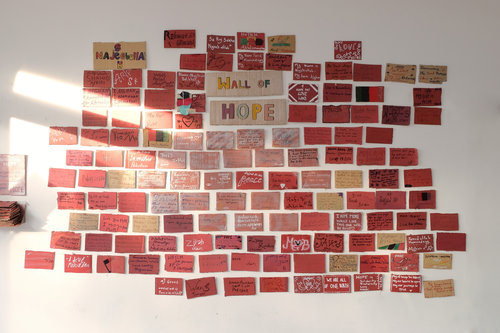- About
- Topics
- Picks
- Audio
- Story
- In-Depth
- Opinion
- News
- Donate
- Signup for our newsletterOur Editors' Best Picks.Send
Read, Debate: Engage.
| June 09, 2020 | |
|---|---|
| topic: | Refugees and Asylum |
| tags: | #Coronavirus, #EU, #migration, #refugees, #asylum seekers, #COVID-19 |
| located: | Bosnia and Herzegovina, Pakistan, Bangladesh, Afghanistan, Morocco, Algeria, Tunisia, Iraq, Syria, Serbia |
| by: | Katarina Panić |
"Bosnia is not a 'parking lot' for migrants heading to the EU, and their countries of origin should pay for their flights back home", Fahrudin Radončić, security minister, stated.
He accused the former government of not doing anything for the last five years to prevent illegal immigration. The current government was appointed at the very end of last year. The new approach to migrants' issues was already in sight, but was then accelerated due to the Coronavirus crisis.
"Firstly, some 8,000 to 9,000 people are an excessive economic burden for this country in a situation when up to 60,000 of our citizens are losing their jobs. Secondly, we want to discourage new migrants from coming to Bosnia once the border crossings liberalise again. Thirdly, we want to show the EU that we are not going to be the depot where the EU countries obtain the selection of the labour force at the expense of our citizens' comfort. Finally, we want to reduce our citizens' fear and uneasiness", Radončić explained the planned effects in the press conference at the end of April.
Since January 2018, Bosnia and Herzegovina has become a key route for migrants to travel from Greece to other parts of the EU. Out of total 60,000 migrants, 8,000 remain stranded in the country. The new Security Ministry repeatedly warned that it is a matter of safety in the first place, not humanity.
"Too many of them don't want to show their ID's or to identify themselves to our security services. It raises the question of why they hide their identities. They may be members of terrorist groups or criminal organisations who run away from their countries, who wait here for a year or two to get a new identity, then go to EU and wait for assignments of their terrorist organisation", Radončić speculated.
He said the new approach relates to illegal economic migrants from Pakistan, Bangladesh, Afghanistan, Morocco, Algeria, Tunisia and Iraq, emphasising all these countries are richer than Bosnia. At the same time, the war refugees from Syria must be taken care of "in an adequate way". He also said that the money the EU currently gives to Bosnia to accommodate migrants (some 40 million Euros last year) should be redirected to repatriate them instead.
"I believe our friends from the EU are going to accept this idea because it is our common problem. If we don't solve it, we are going to have twice as many migrants, some 20,000 in six months only", Radončić stressed.
Following the Security Ministry's order, Bosnia's Service for Foreigners' Affairs, SFA started to compile a list of people for deportation. The final goal - some 10,000 names on it. Neither the camps' residents neither their embassies are willing to cooperate. Migrants are throwing away the survey sheets, not wanting to even talk about returning home, while the embassies say they cannot identify migrants based on biometric data because they only have such databases for those who have committed a crime.
"If not voluntary, the deportation is going to be forced one. Furthermore, because of those who do not want to reveal their identities, we are going to change the laws, saying the one who hides who he is, he is going to jail, not to camps. Ambassadors who do not cooperate, are going to be proclaimed as persona non grata and get back to their countries. We shall not play the helpless government anymore", Radončić added.
"Mister Radončić, have you forgotten that you were also a migrant, shame on you?", Bosnian citizen Behija Hojkurić wrote on her Facebook, alluding Security Minister's Montenegrin origin.
Unlike the prevalent warm welcoming of migrants a few years ago, these days most of the people support the new approach, claiming they will vote in favour of the Security Minister's political party if he fulfils the promise related to the deportation. The initial empathy partially was rooted in the fact that the majority in Bosnia are Muslims as well as the majority of migrants, while the other ethnic and religious groups living in this country have been opposing the influx from the very beginning.
"Give us this minister to solve the same problem in Serbia in the same way, please", a Serbian citizen Jelana Ćirković replied in Facebook comments.
Far away from politicians' cabinets and computer keyboards, a real-life happens to these people. Dozens of activists from South Eastern European countries, under the name of "Transbalkan Solidarity Group", had organised a 48-hour soap-bombing protest campaign directed at the International Organisation for Migration (IOM), which manages camps for the confinement of people on the move in Bosnia and Herzegovina.
"People of all ages are crammed together in the halls with hundreds of beds in the same space. Unaccompanied minors have not been receiving proper care or any education. Hygienic conditions have never been up to the dignifying standards, with very limited access to running water and hot water. Food has never been sufficient. Health care, including psychological care, is reduced to a bare minimum. With the spread of the COVID-19, the camps confining people resemble concentration camps even more", the group stated.
By copying the embed code below, you agree to adhere to our republishing guidelines.

